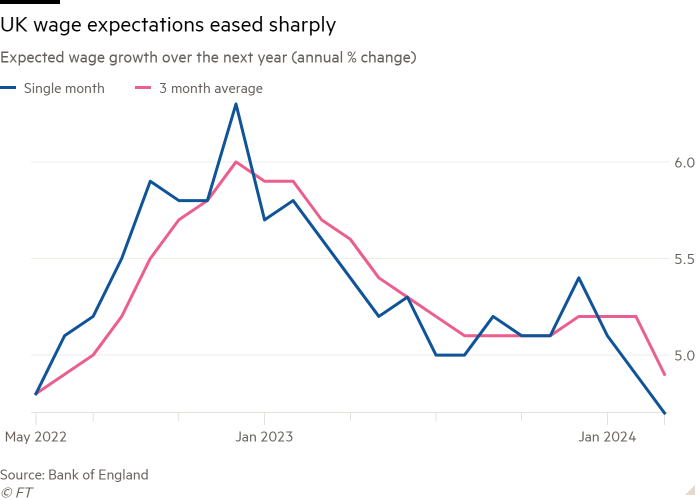Unlock the Editor’s Digest for free
Roula Khalaf, Editor of the FT, selects her favourite stories in this weekly newsletter.
Expectations of wage growth in UK businesses have fallen to a near two-year low, according to a closely watched Bank of England poll that will ease interest rate-setters’ concerns over sticky domestic price pressures.
Chief financial officers predicted wages would rise by 4.7 per cent in the next 12 months, according to a survey conducted by the central bank in March and published on Thursday.
The figure was down from an increase of 4.9 per cent forecast in February and the lowest since the question was first asked in spring 2022.
Businesses have expected pay to rise by more than 5 per cent for most of the past two years. The BoE has in recent months cited strong pay growth expectations as an indicator of persistent domestic price pressures, which it wants to see easing before it cuts interest rates.
Services price growth, which is heavily affected by trends in pay, rose at an annual rate of 6.1 per cent in February. Headline inflation stood at 3.4 per cent, the lowest since 2021.
The drop in wage growth expectations will support the view that the central bank will start reducing rates from a 16-year high of 5.25 per cent in the summer.
Tomasz Wieladek, economist at investment company T Rowe Price, said that although reported wage growth and pay expectations were still not in line with the BoE’s 2 per cent inflation target, “the progress . . . in the data today . . . will reassure the Monetary Policy Committee”.
Alongside easing wage growth in the year to March — it fell to 6.1 per cent from 6.5 per cent in the 12 months to February — businesses continued to report a better outlook for price growth.
In a boost to households hit by the cost of living crisis, survey respondents said they expected to lift prices by 3.7 per cent in the year ahead, down from 4.1 per cent in February and the lowest since September 2021.
CFOs said they raised their prices by an annual rate of 4.8 per cent in March, down from 5.4 per cent in the previous month and the lowest since September 2021, before Russia launched its full-scale invasion of Ukraine.
Businesses also reported weaker employment growth over the past year and the next, which is consistent with cooling domestic price pressures.
In March, the BoE forecast that headline inflation would temporarily fall below the 2 per cent target in the second quarter.
Financial markets are pricing that the BoE will start cutting its benchmark rate in June or August, taking the cost of borrowing to 4.5 per cent by the end of 2024.
Wieladek said that before the BoE started cutting rates, it would want to assess the effects of the 9.8 per cent rise in the minimum wage and changes in migration restrictions in April. This data will not be available before May.
Separate figures published on Thursday showed that the final UK S&P services purchasing managers’ index, a measure of the health of the services sector, was 53.1 in March. This was marginally weaker than the initial reading of 53.4 and down from 53.8 in February.
The figure was, however, well above 50, which indicates expanding activity. The survey also showed that businesses in the sector — which makes up 80 per cent of the UK economy — lifted prices at the slowest pace in six months.
Tim Moore, economics director at S&P Global Market Intelligence, which compiles the survey, said: “The recovery in service sector output lost a little bit of momentum during March, and more so than suggested by the flash PMI results, but the overall picture remains reasonably positive.”


